Avoid being scammed by websites promoting the ERROR CODE 72 scheme
Phishing/ScamAlso Known As: ERROR CODE 72 tech support scam
Get free scan and check if your device is infected.
Remove it nowTo use full-featured product, you have to purchase a license for Combo Cleaner. Seven days free trial available. Combo Cleaner is owned and operated by RCS LT, the parent company of PCRisk.com.
What is the "ERROR CODE 72" scam?
"ERROR CODE 72" is a scam run on deceptive web pages. It has been observed being promoted using azurewebsites[.]net - Microsoft Azure website-hosting platform. "ERROR CODE 72" is classified as a technical support scam. This scheme claims that the device has been infected with several high-risk viruses and urges users to call a fake tech support line.
No website can detect threats/issues present on systems, and those that make such claims are scams. Few visitors to deceptive/scam web pages access them intentionally - most are redirected to them by intrusive advertisements or Potentially Unwanted Applications (PUAs) already installed on the system.
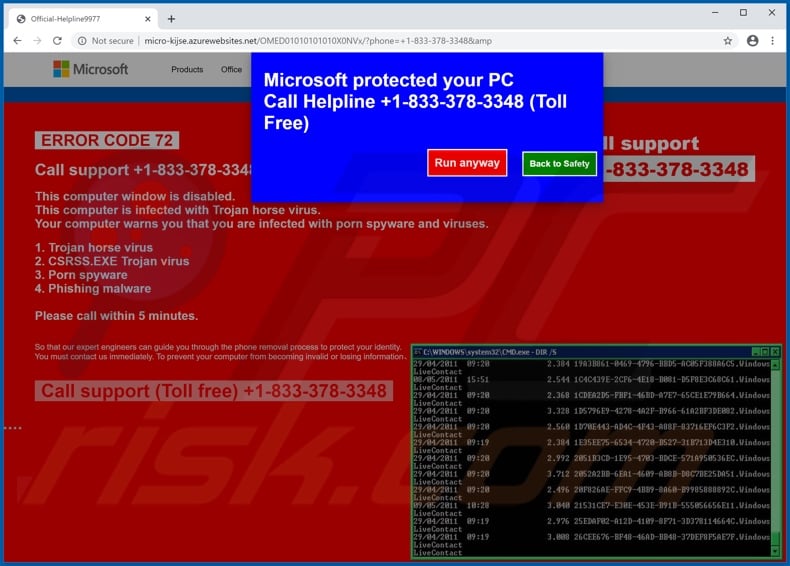
"ERROR CODE 72" scam overview
When a website promoting "ERROR CODE 72" is accessed, it displays a pop-up window, which states that "Microsoft" has protected users' computers. They are urged to call a free helpline. The text presented in the background page claims that the device's screen has been disabled, due to the system being infected with multiple viruses.
These threats are listed as: an unspecified Trojan, CSRSS.EXE Trojan, pornographic spyware and phishing malware infections. Users are asked to call the provided telephone number within five minutes. They must call the helpline to prevent access and data loss by following the removal instructions provided by "expert engineers".
Typically, the "free" technical support lines are expensive and the scammers attempt to keep users talking for as long as possible. Alternatively, the cyber criminals can trick users into allowing them access and control over the supposedly infected device.
The system might also suffer genuine malware infections through alleged anti-virus tools and other software the criminals may offer. Other purposes of such schemes can be to demand payment for fake "services rendered" or to extract personal information from users (e.g. names, addresses, emails, banking account or credit card details, etc.).
To summarize, trusting the "ERROR CODE 72" scam can result in system infections, financial loss, serious privacy issues and even identity theft. Therefore, you are advised to simply ignore the scheme and close the web page displaying it. In some cases, it might be impossible to close a deceptive site and, therefore, Windows Task Manager can be used to end the browser process.
When restarting the browser, the previous session must not be restored, so as not to reopen the scam page (or cause the website that originally redirected to it, to do so again).
As well as force-opening various untrustworthy and malicious sites, PUAs can have additional abilities. Adware-type unwanted apps enable the placement of intrusive advertisements (e.g. pop-ups, banners, coupons, surveys, etc.) on any visited website. These ads diminish the browsing experience.
Furthermore, when clicked, intrusive they can redirect to harmful pages and some can even stealthily download/install rogue software (e.g. PUAs). Others PUA called browser hijackers modify browsers to promote fake search engines, which are rarely capable of providing unique results - they tend to redirect to Google, Yahoo, Bing, and other legitimate search engines.
Furthermore, most PUAs have data tracking capabilities. They can monitor browsing activity (URLs visited, pages viewed, search queries typed, etc.) and collect personal information extracted from it (IP addresses, geolocations and other details). PUA developers often monetize this vulnerable data by sharing it with and/or selling it to third parties.
Therefore, to ensure device integrity and user safety, remove all suspect applications and browser extensions/plug-ins immediately upon detection.
| Name | ERROR CODE 72 tech support scam |
| Threat Type | Phishing, Scam, Social Engineering, Fraud. |
| Fake Claim | Scam claims that users' devices are infected with multiple viruses. |
| Tech Support Scammer Phone Number | +1-833-378-3348, +81 050-5809-7644 |
| Symptoms | Fake error messages, fake system warnings, pop-up errors, hoax computer scan. |
| Distribution methods | Compromised websites, rogue online pop-up ads, potentially unwanted applications. |
| Damage | Loss of sensitive private information, monetary loss, identity theft, possible malware infections. |
| Malware Removal (Windows) |
To eliminate possible malware infections, scan your computer with legitimate antivirus software. Our security researchers recommend using Combo Cleaner. Download Combo CleanerTo use full-featured product, you have to purchase a license for Combo Cleaner. 7 days free trial available. Combo Cleaner is owned and operated by RCS LT, the parent company of PCRisk.com. |
Similar scam examples
"Killer's IP Address", "VIRUS ALERT FROM Windows", "Windows firewall has blocked some features of this program" and "WIN.DLL011150 Error" are some examples of other technical support scams. There are thousands of deceptive web pages online.
They use social engineering and scare tactics to trick users into performing certain actions. Popular scam models include: warnings that the device is infected, alerts that an essential piece of software is outdated, fake prize giveaways, "unbelievable" offers/deals, and so on.
These schemes try to encourage users into: calling expensive "helplines", downloading/installing and/or purchasing untrusted or malicious software, paying bogus fees, revealing personal information, etc. Regardless of what these scams claim, the purpose is identical: to generate revenue for the scammers/cyber criminals behind them.
How did potentially unwanted applications install on my computer?
PUAs can be downloaded/installed with other software. This deceptive marketing technique of pre-packing regular products with unwanted or malicious additions is termed "bundling". Rushing download/installation processes (e.g. ignoring terms, using pre-set options, etc.) increases the risk of unintentionally allowing dubious and/or bundled content into the device.
Some PUAs have "official" download web pages, which are commonly promoted by scam sites. Intrusive advertisements proliferate these applications as well. Once clicked, they can execute scripts to download/install PUAs without users' permission.
How to avoid installation of potentially unwanted applications
You are advised to research all software before download/installation or purchase. All downloads must be done from official and verified sources. Untrusted channels such as unofficial and free file-hosting websites, P2P sharing networks (BitTorrent, Gnutella, eMule, etc.) and other third party downloaders offer bundled content, and therefore should be avoided.
When downloading/installing, it is important to read the terms, explore all available options, use the "Custom/Advanced" settings and opt-out of additional apps, tools, functions, and so on. Intrusive ads typically seem legitimate and harmless, however, they can redirect to various dubious pages (e.g. gambling, pornography, adult-dating and others).
If you encounter these ads/redirects, inspect the system and immediately remove all suspicious applications and browser extensions/plug-ins. If your computer is already infected with PUAs, we recommend running a scan with Combo Cleaner Antivirus for Windows to automatically eliminate them.
Text presented in the "ERROR CODE 72" scam pop-up window:
Microsoft protected your PC
Call Helpline +1-833-378-3348 (Toll Free)
Run anyway Back to Safety
Screenshot of "ERROR CODE 72" scam background page:
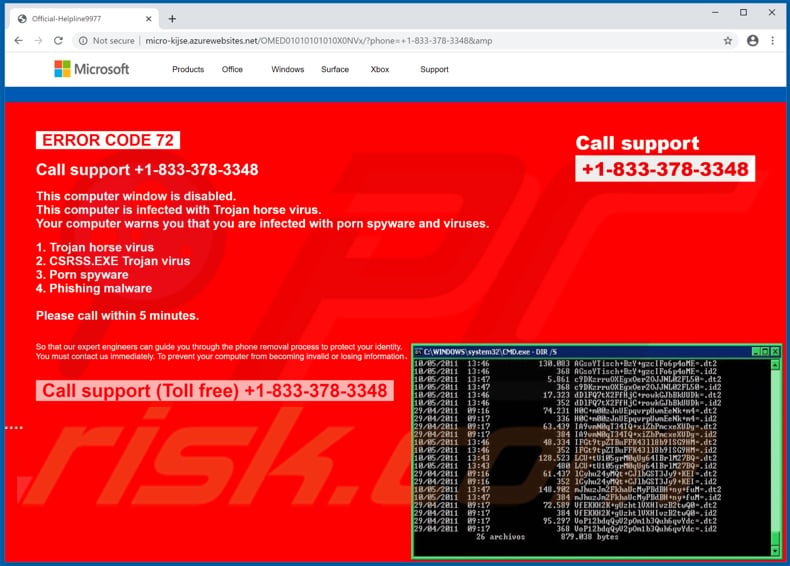
Text presented in this page:
Products Office Windows Surface Xbox Support
Call support
+1-833-378-3348
ERROR CODE 72
Call support +1-833-378-3348
This computer window is disabled.
This computer is infected with Trojan horse virus.
Your computer warns you that you are infected with porn spyware and viruses.
1. Trojan horse virus
2. CSRSS.EXE Trojan virus
3. Porn spyware
4. Phishing malware
Please call within 5 minutes.
So that our expert engineers can guide you through the phone removal process to protect your identity.
You must contact us immediately. To prevent your computer from becoming invalid or losing information、
Call support (Toll free) +1-833-378-3348
The appearance of "ERROR CODE 72" pop-up scam (GIF):
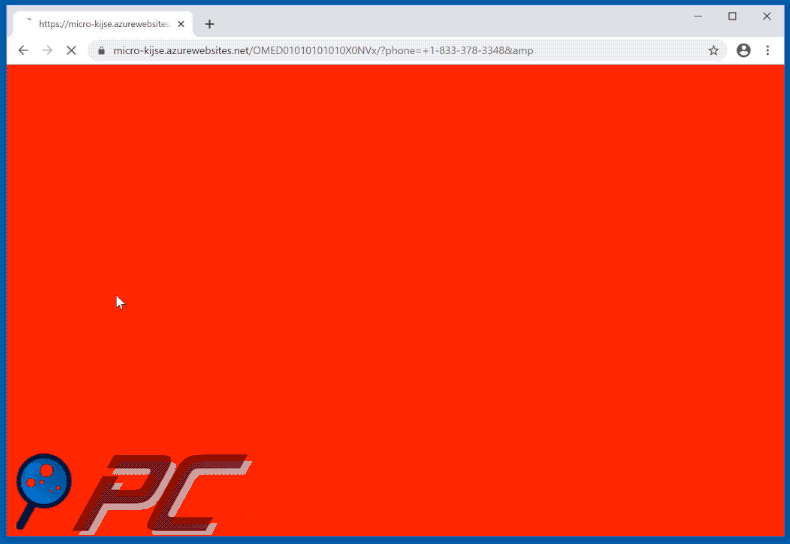
Another variant of "ERROR CODE 72" pop-up scam (the code is "32" instead of "72" and the website also downloads a file):
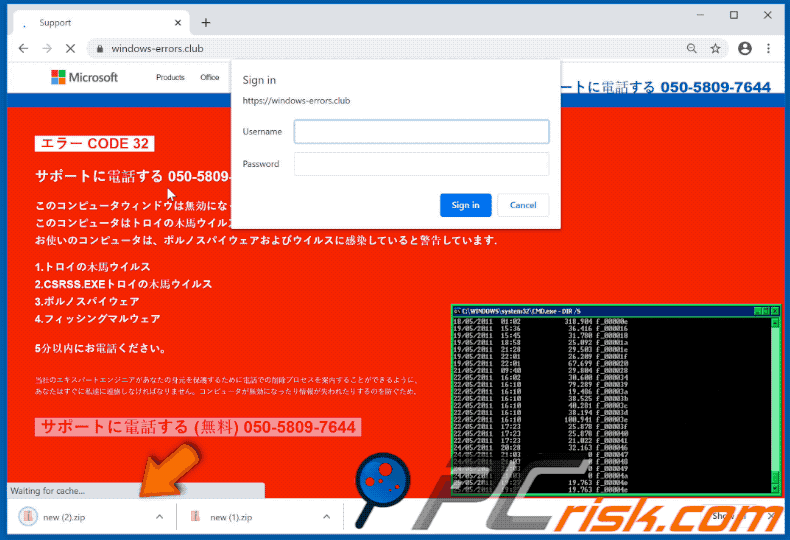
Another variant of "ERROR CODE 72" pop-up scam:
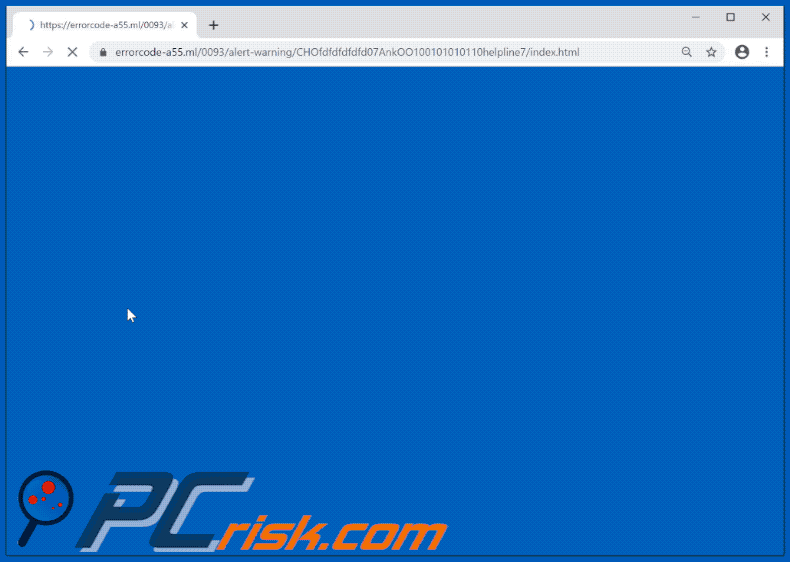
Instant automatic malware removal:
Manual threat removal might be a lengthy and complicated process that requires advanced IT skills. Combo Cleaner is a professional automatic malware removal tool that is recommended to get rid of malware. Download it by clicking the button below:
DOWNLOAD Combo CleanerBy downloading any software listed on this website you agree to our Privacy Policy and Terms of Use. To use full-featured product, you have to purchase a license for Combo Cleaner. 7 days free trial available. Combo Cleaner is owned and operated by RCS LT, the parent company of PCRisk.com.
Quick menu:
- What is ERROR CODE 72 tech support scam?
- How to identify a pop-up scam?
- How do pop-up scams work?
- How to remove fake pop-ups?
- How to prevent fake pop-ups?
- What to do if you fell for a pop-up scam?
How to identify a pop-up scam?
Pop-up windows with various fake messages are a common type of lures cybercriminals use. They collect sensitive personal data, trick Internet users into calling fake tech support numbers, subscribe to useless online services, invest in shady cryptocurrency schemes, etc.
While in the majority of cases these pop-ups don't infect users' devices with malware, they can cause direct monetary loss or could result in identity theft.
Cybercriminals strive to create their rogue pop-up windows to look trustworthy, however, scams typically have the following characteristics:
- Spelling mistakes and non-professional images - Closely inspect the information displayed in a pop-up. Spelling mistakes and unprofessional images could be a sign of a scam.
- Sense of urgency - Countdown timer with a couple of minutes on it, asking you to enter your personal information or subscribe to some online service.
- Statements that you won something - If you haven't participated in a lottery, online competition, etc., and you see a pop-up window stating that you won.
- Computer or mobile device scan - A pop-up window that scans your device and informs of detected issues - is undoubtedly a scam; webpages cannot perform such actions.
- Exclusivity - Pop-up windows stating that only you are given secret access to a financial scheme that can quickly make you rich.
Example of a pop-up scam:

How do pop-up scams work?
Cybercriminals and deceptive marketers usually use various advertising networks, search engine poisoning techniques, and shady websites to generate traffic to their pop-ups. Users land on their online lures after clicking on fake download buttons, using a torrent website, or simply clicking on an Internet search engine result.
Based on users' location and device information, they are presented with a scam pop-up. Lures presented in such pop-ups range from get-rich-quick schemes to fake virus scans.
How to remove fake pop-ups?
In most cases, pop-up scams do not infect users' devices with malware. If you encountered a scam pop-up, simply closing it should be enough. In some cases scam, pop-ups may be hard to close; in such cases - close your Internet browser and restart it.
In extremely rare cases, you might need to reset your Internet browser. For this, use our instructions explaining how to reset Internet browser settings.
How to prevent fake pop-ups?
To prevent seeing pop-up scams, you should visit only reputable websites. Torrent, Crack, free online movie streaming, YouTube video download, and other websites of similar reputation commonly redirect Internet users to pop-up scams.
To minimize the risk of encountering pop-up scams, you should keep your Internet browsers up-to-date and use reputable anti-malware application. For this purpose, we recommend Combo Cleaner Antivirus for Windows.
What to do if you fell for a pop-up scam?
This depends on the type of scam that you fell for. Most commonly, pop-up scams try to trick users into sending money, giving away personal information, or giving access to one's device.
- If you sent money to scammers: You should contact your financial institution and explain that you were scammed. If informed promptly, there's a chance to get your money back.
- If you gave away your personal information: You should change your passwords and enable two-factor authentication in all online services that you use. Visit Federal Trade Commission to report identity theft and get personalized recovery steps.
- If you let scammers connect to your device: You should scan your computer with reputable anti-malware (we recommend Combo Cleaner Antivirus for Windows) - cyber criminals could have planted trojans, keyloggers, and other malware, don't use your computer until removing possible threats.
- Help other Internet users: report Internet scams to Federal Trade Commission.
Frequently Asked Questions (FAQ)
What is a pop-up scam?
Pop-up scams are deceptive messages designed to trick users into carrying out certain actions. For example, victims may be enticed/scared into calling fake helplines, allowing cyber criminals to access devices remotely, sending money to scammers, downloading/installing software, providing sensitive data, purchasing products, subscribing to services, etc.
What is the purpose of a pop-up scam?
Pop-up scams aim to generate revenue at victims' expense. Cyber criminals primarily profit by acquiring funds through deception, promoting content (e.g., websites, products, services, etc.), abusing/selling private information, and spreading malware.
Why do I encounter fake pop-ups?
Pop-up scams are most commonly endorsed via websites that utilize rogue advertising networks, intrusive ads, misspelled URLs, spam browser notifications, and adware.
I cannot exit a scam page, how do I close it?
If you cannot close a scam site, end the browser's process using Task Manager. When relaunching the browser, remember to start a new browsing session, as the previous one includes the deceptive page.
I have allowed cyber criminals to remotely access my computer, what should I do?
If you have permitted cyber criminals to access your device remotely, you must first disconnect it from the Internet. Afterward, uninstall the remote access software the criminals used (e.g., UltraViewer, TeamViewer, etc.), as they might not need your consent to reconnect. Lastly, perform a full system scan and eliminate all detected threats.
I have provided my personal information when tricked by a pop-up scam, what should I do?
If you have provided your log-in credentials, change the passwords of all potentially compromised accounts and inform their official support. And if you've disclosed other private information (e.g., passport scans/photos, ID card details, credit card numbers, etc.), contact the appropriate authorities without delay.
Will Combo Cleaner protect me from pop-up scams and the malware they proliferate?
Combo Cleaner can scan visited websites for rogue, deceptive, and malicious content. It can also deny all further access to such sites. Additionally, Combo Cleaner can detect and remove almost all known malware infections. Keep in mind that performing a complete system scan is essential since sophisticated malicious software usually hides deep within systems.
Share:

Tomas Meskauskas
Expert security researcher, professional malware analyst
I am passionate about computer security and technology. I have an experience of over 10 years working in various companies related to computer technical issue solving and Internet security. I have been working as an author and editor for pcrisk.com since 2010. Follow me on Twitter and LinkedIn to stay informed about the latest online security threats.
PCrisk security portal is brought by a company RCS LT.
Joined forces of security researchers help educate computer users about the latest online security threats. More information about the company RCS LT.
Our malware removal guides are free. However, if you want to support us you can send us a donation.
DonatePCrisk security portal is brought by a company RCS LT.
Joined forces of security researchers help educate computer users about the latest online security threats. More information about the company RCS LT.
Our malware removal guides are free. However, if you want to support us you can send us a donation.
Donate
▼ Show Discussion